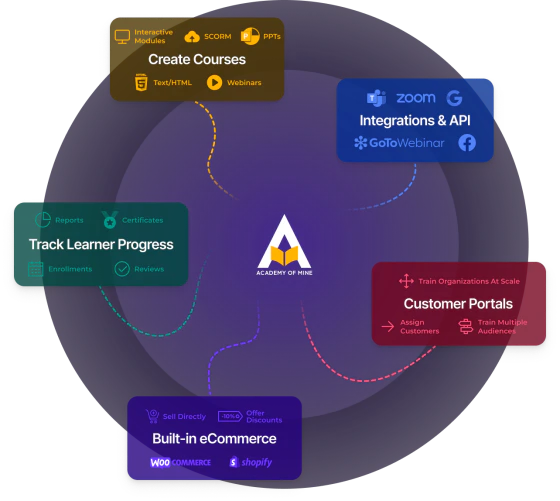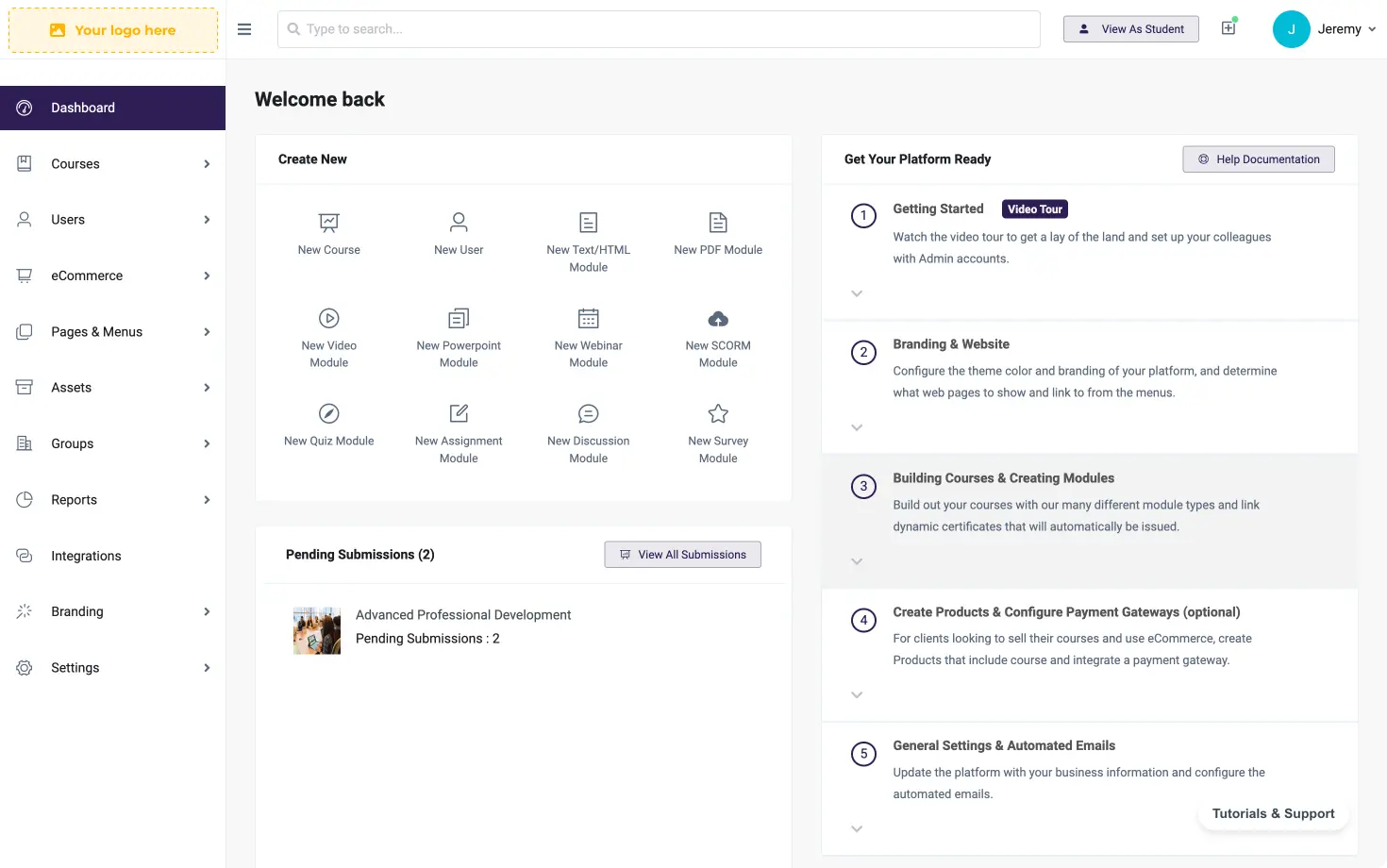Continuing Education, Continuing Medical Education, Professional Training, Safety Training
Top 15 Continuing Education eLearning Platform Components

Continuing education (CE) is critical in today’s professional world, especially as jobs become more competitive and professional license requirements remain strict. CE provides the necessary tools and training for workers to become more effective in industries such as law (CLE), medicine (CME), and accountancy (CPE), among others.
In order to stay competitive and grow your business’s bottom line, as a continuing education provider you must embrace new and improved technology. Traditionally, continuing education has been taught in brick-and-mortar locations, but In the past decade thanks to the growing popularity of eLearning, CE courses are being taken more online. eLearning is convenient for busy working professionals and can be just as effective, if not more effective than traditional in-person learning.
So how can you offer CE courses online? The software application is called a Learning Management System (LMS) and it’s designed for delivering, managing, and reporting eLearning. Inside of an LMS, students can access course materials remotely on their own schedule – engage with and learn on-demand with digital content like videos and PDFs – take quizzes and assignments – and participate in webinars or other forms of live virtual training to get certified.
When it comes to finding an LMS that supports continuing education while providing your users with an excellent learning experience, we recommend looking for the following components in a platform:
- Intuitive UX
- Customizable & Automated Certificate Generation
- Sell Courses Externally
- Automatic Transfer of CE credits
- Platform Customizations
- 3rd-Party Integrations
- Prevent Users from Skipping Ahead
- Flexible eCommerce Integration
- Adjustable User Permissions and Controls
- Course Management & Content Creation
- Reporting & Analytics Tools
- Webinars and Live Virtual Learning
- Social Learning
- Track Time Users Spend in a Course
- Identity Verification
Intuitive UX
The best LMS for Continuing Education should support a wide variety of students and allow your business to continue to grow. It is important that your platform’s UX be attractive, user-friendly, and intuitive in its navigation!
Best LMS for Continuing Education
Customizable & Automated Certificate Generation
Since course licensing or accreditation numbers may be required, certificates must be customizable per federal, state, and regional CE accrediting body requirements. Another added benefit to certificates being automatically generated upon course completion is students can access and download them at any point in time after being certified.

Additionally, an LMS for Continuing Education should be able to offer a Certificate Verification tool especially for CE Credits using something like a QR Code or a form where Learners can either scan the QR Code or enter their Unique Certificate Code to be able to verify their Continuing Education (CE) credits and the certificate of completion.
Sell Courses Externally
Leverage additional revenue streams by using an LMS to sell CE courses to organizations for employees and members. Define pricing, course access, and size of classrooms, as well as designate an organization-level group course manager to oversee enrollment and manage student progress.
Automatic Transfer of CE credits
Your platform should offer the option to electronically transfer earned CE credits to associations or governing bodies overseeing Continuing Education licensing programs. This helps provide peace of mind to your users, knowing they’re automatically tracking which continuing education credits they have earned.
We use CE broker to automate this transfer and make sure fulfilling continuing education requirements is easy for all parties involved!
Platform Customizations
Your platform’s functionality should be robust but adjustable. Using an LMS vendor that offers software customizations gives you the flexibility to personalize and update your platform as industries evolve and your company’s needs change!
Third-Party Integrations
Integrations are the solution for combining multiple software applications together to function as one system. All great LMSs allow you to integrate with a wide selection of third-party tools like Zoom or Hubspot to improve your CE courses.
Academy Of Mine integrates with many popular software apps by default and if your company ever needs to integrate with a tool that we don’t currently support, we’ll be happy to custom integrate it for you!
Prevent Users from Skipping Through an On Demand Course
You want to make sure that people enrolled in CE courses are completing their training in full to earn their credits. Choose a platform that restricts or at least gives admins to option to restrict users from accessing future modules and sections in a course until earlier ones are completed.
We have a feature in Academy Of Mine that prevents users from not only skipping through a course but also skipping through a video (of course, you can toggle these features on or off).

Flexible eCommerce Integration
Your platform should allow you to Integrate with established payment gateways such as Braintree by PayPal, Stripe, and Authorize.net so that customers can pay for Continuing Education courses securely. Depending on the complexity of your business, you may also want to consider other eCommerce features in an LMS, such as the support of coupon codes or memberships and monthly payments.
Adjustable User Permissions
There needs to be a clear differentiation between what administrators can do in a course versus CE customers and those training. By default, site admins have full control over their LMS and can perform higher-level actions like add new users into a course and grant admin access to students – students who are training have limited permissions so they can’t grade their own tests and add or remove other users into a training, etc.
Course Management and Content Creation
Create and manage professional CE courses that consist of engaging modules and content you created inside of the platform. Engage students in different ways by importing a variety of mediums (PDF, PowerPoint, video, & more) to create a personalized learning experience for your professionals in training.
Your platform should also support SCORM so that content from prior LMSs can be easily imported, and new content can be reused if you ever switch providers!
Reporting Tools
Professionals enrolled in CE courses will want to know what scores they’re receiving on tests, quizzes, and other graded assignments so that they can stay on track for completing training and gaining continuing education credits (CEU). Your platform used to deliver continuing education courses should have built-in reporting tools and analytics so that students can effortlessly manage their progress in a course, and instructors can efficiently report on their students.

Webinars and Live-Learning
In eLearning, the closest experience to studying in a traditional classroom setting is a live webinar attended by students and instructors. Live virtual learning is an excellent alternative to in-person instruction; your LMS must offer a live webinar solution native to the platform.
See how one of our customers benefitted from using webinars in their custom-built eLearning platform.
Social Learning
Interaction between students and teachers is an important aspect of education. Social learning is anything from your learners sharing their opinions of a course on social media, to students in a CE training interacting with other each other via a discussion board or webinar!
Certain LMS vendors emphasize this feature more than others so you will want to consider all options when looking at vendors.
Track How Much Time a Student Spends in a Course
Predict users’ success and gauge the efficiency of your courses by tracking average time spent in a course or module, monitor how long individuals or groups of students are spending on a specific assignment, and watch how students are progressing in a course.
Being able to track the time your CE customers are spending in a module or a whole course can be helpful in eliminating inefficiencies in your business.
Identity Verification
Since the majority of CE customers are taking a course to fulfill licensure requirements in their career, it’s important to ensure that everybody enrolled in your platform is legally who they say they are. An identity verification feature fulfills CE accrediting body requirements and lends credibility to the courses and platform.
Let’s Scale Your Continuing Education Business!
If you are interested in creating an online learning platform to deliver CE courses, then Academy Of Mine may be the right solution for you. You can view our platform’s features here.

